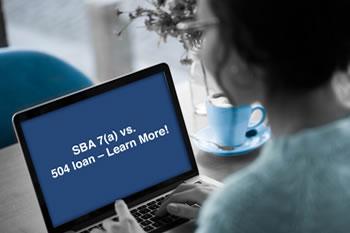Our SBA lending solutions can finance 90% - 100% of your real estate purchase. Combined with a 25-year term, these solutions drive down your monthly payments and keep more cash in your business. With an SBA loan, you can finance acquiring the property, making needed improvements, buying additional FF&E or machinery, and working capital to cover expenses and other needs – all in one long-term loan. We can also finance ground-up construction with all of the same benefits if a workable property is not available in your market.
Solutions
- Customized lending solutions using SBA 7(a), 504, and Express loans – or a combination of all three
- Financing for both multi-use or special-use properties
- Financing for property improvements or ground up construction
- Dedicated Construction Group to work with you and your contractor throughout the process
Benefits
- 90% - 100% financing available
- Quarterly variable, 3-year fixed rate, or 5-year fixed rate structures available
- Full 25-year term on most real estate acquisitions
- No balloon payments or call options
- No loan covenants or deposit requirements
FAQs
Our experienced team is here to help you navigate the commercial real estate financing process. Check out the answers below to questions we often receive from borrowers.
- What type of SBA loan is used to finance a real estate acquisition transaction?
A real estate transaction can be financed using either an SBA 7(a) loan or an SBA 504 loan.
These loan products can be used in combination to meet business financing needs not eligible under SBA 504 rules.
- How long is the term of the loan?
With an SBA 7(a), loan the term can be up to 25 years depending on the use of loan proceeds. SBA 7(a) loans with a term of 15 years or longer have a 5-3-1 prepayment penalty per SBA rules.
With an SBA 504 loan, we structure the 1st Trust Loan with a 25-year term and a 5-4-3-2-1 prepayment penalty in the first five years only. The 40% funded by the Certified Development Company (CDC) is 25 years as well, has prepayment penalties for the first 10 years.
- How much money do I need to acquire a building to operate my business from?
The SBA 7(a) product allows lenders to offer 100% financing on owner-occupied real estate in many instances. At FNB Small Business Finance, we offer 100% financing to existing businesses for rent replacement and to businesses that fall under our Professional and Senior Care guidelines. Ask your Business Development Officer for details.
In other cases, on an SBA 7(a) loan, we require an equity injection of 10% of the purchase price of the subject real estate.
If the real estate is part of a business acquisition transaction, the SBA requires equity of 10% on the real estate as well as the business acquisition.
Per the SBA rules, the SBA 504 loan product requires a minimum equity injection of 10% of the Total Project Cost. It also requires an additional 5% equity if the property is considered special use, and an additional 5% equity if the business is a startup.
The SBA 504 rules classify a business acquisition as a startup, so real estate acquired as part of a business acquisition transaction will require the additional 5% equity on the real estate portion of the deal.
If you are considering the SBA 504 loan product as an option, your Business Development Officer can introduce you to a representative of a Certified Development Company to answer all your questions about a 504 loan.
- How should I hold the real estate?
SBA rules allow a business owner to set up what’s called an Eligible Passive Company (EPC) to hold the real estate asset separately from their Operating Company (OC).
In the SBA loan structure, the EPC and the OC are considered co-borrowers. All owners of 20% or more of either entity are required to give an unlimited personal guarantee on the loan.
The EPC is limited by SBA rules in the amount of rent it can charge the OC. Rent is limited to the amount of the loan payment plus taxes, insurance, and maintenance costs.
We encourage all borrowers to consult their accountant and attorney to determine their optimal ownership structures.
- Do I have to occupy the entire building to be eligible for SBA financing?
Both the SBA 7(a) and SBA 504 loan products require the Operating Company (OC) to occupy at least 51% of the space in the building, 60% if new construction, to be eligible. SBA financing is not available for income-producing rental properties.
The SBA rules require that the EPC lease the entire building and property to the OC. The OC may sublease some space based on occupancy eligibility requirements. There are no rules governing the amount of rent the OC can charge on its subleases to other businesses.
The SBA rules prohibit the use of loan funds to be used for improvements to portions of any building that will be subleased by the OC to another company.
- What environmental due diligence does First National Bank Small Business Finance do on the property?
The SBA, First National Bank Small Business Finance, and most qualified environmental consultants require the completion of an Environmental Questionnaire (EQ) by the seller of the property. If the seller refuses to complete this, a Phase 1 Environmental Report by a qualified environmental consultant will be required.
Our policy on all loans under $3MM requires both the Environmental Questionnaire completed by the seller and a Records Search Risk Assessment (RSRA) report from a qualified environmental consultant. If the loan amount is $3MM or more, or if the EQ or RSRA identify any environmental risks, we require a Phase 1 Environmental Report by a qualified environmental consultant on the subject property.
The SBA has published a list of NAICS codes that correlate with inherently environmentally risky properties because of the industry that will require a Phase 1 Environmental Report.
If any Phase 1 report indicates there are one or more Recognized Environmental Conditions (RECs) on the property, then a Phase 2 and any necessary remediation will be required on the property prior to closing.
- What about the real estate appraisal?
All loans for real estate acquisitions require an appraisal by a qualified appraiser approved by First National Bank Small Business Finance.
All appraisals must be ordered, reviewed, and approved by our team. We can pre-order an appraisal prior to credit approval once we receive the funds to pay for it from the borrower. These funds will be credited towards any required equity injection on the project. Typically, we do not require appraisals be done prior to credit approval that would be subject to a satisfactory appraisal.
All SBA loans must be structured based on the appraised value of the property from the appraisal. If the appraisal comes in below the contract price, then either the purchase price would need to be renegotiated or any overage will need to be satisfied outside the SBA loan should the borrower want to proceed with the purchase at the price more than the appraised value.
If building improvements are being made and financed, an as-completed appraisal will be required.
Depending on the time of year, we generally see appraisals taking 4-6 weeks to complete and go through internal review. All appraisals are put out for bids to qualified appraisers in the area where the property is located, bids include both a cost and delivery date. You will be able to review the responses with your BDO to help determine which bid we would want to accept.
- How long does the process take to close?
From the time your BDO gets a complete package into our Credit Underwriting Department it normally takes 10 business days to a credit decision.
From the time the loan is approved, and you accept and the loan commitment, it normally takes 45-60 days to close the loan. If there is construction involved, it will normally take longer as we cannot close until a building permit is issued.
- Do you have any industries or types of businesses you don’t lend to?
Hotels and Motels
Gas Stations and C-Stores with gas
Firearms Manufacturers and Retailers
Nursing Homes and Assisted Living
Family Entertainment Centers
Golf Courses
- What are your primary Credit Underwriting requirements for a Commercial Real Estate loan?
- Business Net Profit per Books
- Depreciation, Amortization, other non-cash charges
- Rent expense if rent is being replaced by property ownership.
- Charge for Capital Expenditures (CAPEX) for businesses with historic annual CAPEX needs.
- Other add-backs for non-recurring expenses may be considered on a case-by-case basis with sufficient documentation.
We look for a Cash Flow Coverage Ratio sufficient to support the living expenses of the buyer and to repay the loan for the past one year and interim period for the subject business. Minimum requirements may vary depending on the details of the transaction. Your Business Development Officer can review your transaction and advise you.
Typical Cash Flow calculations include the net of:
Personal credit score minimum 650 for all guarantors.
SBA rules require borrowers to pledge all available collateral to secure the loan. This includes all business assets and all personal assets of guarantors up to 100% of Loan to Discounted Collateral Value (LTDCV).
If business expansion, a thorough business plan with 2 years of projections and assumptions is required. First-year projections by month with annual totals, second-year annualized.
All SBA rules apply.
Pre-Application Checklist:
When you’re ready to get started, please reach out to one of our Business Development Officers. The following list will help you prepare for our initial conversation.
- Estimated project costs
- Three years of tax returns, interim financial statements on existing business(es) including Income Statement, Balance Sheet, Debt Schedule
- Three years personal tax returns – all owners 20%+
- Personal Financial Statement – all owners 20%+








